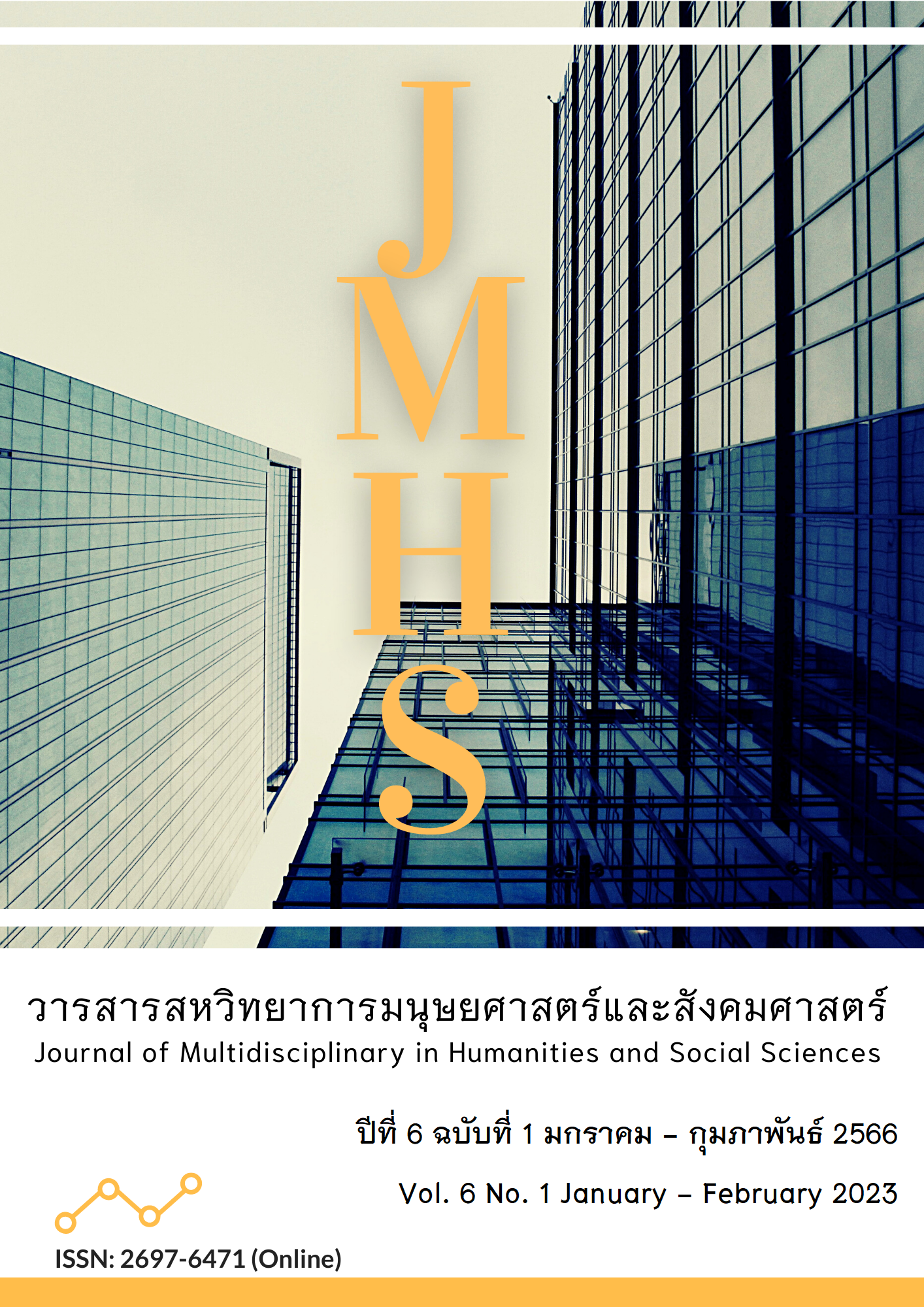Developing the Administrative Model of the Quality School of the Community
Main Article Content
Abstract
This research is a mixed research method. The qualitative and quantitative data were collected for the purpose of research to develop a quality community school administration model. by studying basic information from the study of quality school management guidelines document synthesis A study of schools with best practices, interviews with 6 experts, and studying current and expected conditions of quality school management. By asking the opinions of 133 informants, specifying the format, and Making issues in the management of quality schools. Create and verify the accuracy and feasibility by inspecting from 9 experts and assessing the suitability and usefulness. 36 stakeholders analyzed the data by analyzing content, finding frequency, percentage, mean, standard deviation, and PNI modified index.
The results of the research revealed the development of the quality school administration model of the community. The community quality school management model (5 Quality school Model) consists of 5 elements as follows: Component 1 Principles of community quality school administration. Component 2: Objectives of Community Quality School Management Component 3: The scope of missions for community quality school administration Component 4: Guidelines for evaluating community quality school administration and Component 5: Factors affecting the success of community quality school administration.
Article Details

This work is licensed under a Creative Commons Attribution-NonCommercial-NoDerivatives 4.0 International License.
Views and opinions appearing in the Journal it is the responsibility of the author of the article, and does not constitute the view and responsibility of the editorial team.
References
โกศล จิตวิรัตน์. (2562). ปัจจัยแห่งความสำเร็จในการเปลี่ยนแปลงสู่องค์การดิจิทัลไทยแลนด์ 4.0 ในศตวรรษที่ 21. Humanities, Social Sciences, and Arts, 12(6), 1,796-1,816.
ชูศรี วงศ์รัตนะ. (2558). เทคนิคการเขียนเค้าโครงการวิจัย : แนวทางสู่ความสำเร็จ. (พิมพ์ครั้งที่ 3). กรุงเทพฯ: อมรการพิมพ์.
ธีระ รุญเจริญ. (2550). ความเป็นมืออาชีพในการจัดการและบริหารการศึกษาในยุคปฏิรูปการศึกษา. กรุงเทพฯ: ข้าวฟ่าง.
นรรัชต์ ฝันเชียร. (2562). การส่งเสริมการศึกษาไทยเพื่อรับมือกับโลกยุค VUCA. สืบค้นเมื่อ 17 เมษายน 2564, จาก https://www.trueplookpanya.com/blog/content/76134/
บุญชม ศรีสะอาด. (2554). การวิจัยเบื้องต้น. (พิมพ์ครั้งที่ 9). กรุงเทพฯ: สุวีริยาสาส์น.
เบญจนารถ อมรประสิทธิ์. (2557). รูปแบบการบริหารสู่ความเป็นเลิศของโรงเรียนอนุบาลประจำจังหวัด. พิษณุโลก: มหาวิทยาลัยนเรศวร.
ปาณิสรา สิงหพงษ์. (2555). การบริหารตามแนวรางวัลคุณภาพแห่งชาติที่ส่งผลต่อการเป็นโรงเรียนมาตรฐานสากลในสังกัดสำนักงานเขตพื้นที่การศึกษามัธยมศึกษา เขต 14 จังหวัดปทุมธานี. (วิทยานิพนธ์ศึกษาศาสตรมหาบัณฑิต). มหาวิทยาลัยเทคโนโลยีราชมงคลธัญบุรี.
มนต์นภัส มโนการณ์. (2561). การปฏิรูปการศึกษาขั้นพื้นฐานกับการจัดการศึกษาเชิงพื้นที่. วารสารวิชาการศึกษาศาสตร์, 19(1), 1-15.
รัตนะ บัวสนธ์. (2563). การวิจัยและพัฒนานวัตกรรมการศึกษา. (พิมพ์ครั้งที่ 2). กรุงเทพฯ: จุฬาลงกรณ์มหาวิทยาลัย.
วาโร เพ็งสวัสดิ์. (2553). การวิจัยพัฒนารูปแบบ. วารสารมหาวิทยาลัยราชภัฏสกลนคร, 2(14), 1-15.
วรวรรณ สังสัพพันธ์. (2560). การพัฒนาระบบการประเมินคุณภาพภายในที่เน้นการนำผลไปใช้พัฒนาคุณภาพการศึกษาของสถานศึกษาขั้นพื้นฐาน: การประยุกต์ใช้การประเมินแบบเสริมพลัง. (วิทยานิพนธ์ครุศาสตร์ดุษฎีบัณฑิต). มหาวิทยาลัยจุฬาลงกรณ์มหาวิทยาลัย.
สำนักงานเลขาธิการสภาการศึกษา. (2562). สภาวะการศึกษาไทย 2561/2562 การปฏิรูปการศึกษาในยุคดิจิทัล. กรุงเทพฯ: สำนักงานเลขาธิการสภาการศึกษา.
สำนักงานเลขาธิการสภาการศึกษา. (2564). ข้อเสนอระบบการเรียนรู้ที่ตอบสนองการเปลี่ยนแปลงของโลกอนาคตในปี 2040. กรุงเทพฯ: สำนักงานเลขาธิการสภาการศึกษา.
สำนักงานรับรองมาตรฐานและประเมินคุณภาพการศึกษา (องค์การมหาชน). (2560). กรอบแนวทางการประเมินคุณภาพภายนอกรอบสี่ (พ.ศ. 2559-2563). ม.ป.ท.
สำนักงานคณะกรรมการการศึกษาขั้นพื้นฐาน. (2563). ร่างโรงเรียนคุณภาพของชุมชน สังกัดสำนักงานคณะกรรมการการศึกษาขั้นพื้นฐาน. ม.ป.ท.
สำนักงานคณะกรรมการการศึกษาขั้นพื้นฐาน. (2564). คู่มือการจัดตั้งงบประมาณประจำปีงบประมาณ พ.ศ. 2564. ม.ป.ท.
สำนักงานรางวัลคุณภาพแห่งชาติ. (2560). เกณฑ์รางวัลคุณภาพแห่งชาติ ปี 2561-2562. TQA Criteria for Performance Excellence Framework 2561-2562. กรุงเทพฯ: ตะวันออก.
สำนักบริหารงานการมัธยมศึกษาตอนปลาย. (2553). คู่มือการบริหารจัดการระบบคุณภาพโรงเรียนมาตรฐานสากล. ม.ป.ท.
สุวดี อุปปินใจ. (2564). ระบบและกลไกการบริหารคุณภาพการศึกษาของสถานศึกษาขั้นพื้นฐานที่สามารถตอบสนองการเปลี่ยนแปลงในโลกอนาคต. วารสารศิลปการจัดการ, 6(3), 1369-1391.
สมกิต บุญยะโพธิ์. (2558). รูปแบบการบริหารสถานศึกษาขั้นพื้นฐานสังกัดสำนักงานเขตพื้นที่การศึกษาประถมศึกษาสู่ความเป็นเลิศ. กรุงเทพฯ: มหาวิทยาลัยศิลปากร.
สมาพร ลี้ภัยรัตน์. (2560). รูปแบบการบริหารคุณภาพโรงเรียนมาตรฐานสากล ระดับประถมศึกษา. นครสวรรค์: มหาวิทยาลัยราชภัฏนครสวรรค์.
สมาน อัศวภูมิ. (2558). รูปแบบการบูรณาการระบบการประกันคุณภาพภายในกับการบริหารสถานศึกษา สำหรับสถานศึกษาขั้นพื้นฐานขนาดกลาง. วารสารบริหารการศึกษาบัณฑิต, 5(2), 185-192.
อร่าม วัฒนะ. (2561). รูปแบบการบริหารสถานศึกษาสู่ความเป็นเลิศของโรงเรียนสังกัดองค์การบริหารส่วนจังหวัด. (วิทยานิพนธ์ครุศาสตรดุษฎีบัณฑิต). มหาวิทยาลัยราชภัฏนครสวรรค์.
Brown, W.B., & Moberg, D.J. (1980). Organization Theory and Management: A Macro Approach. New York: John Wiley and Sons.
Creswell, J.W., & Plano Clark, V.L. (2011). Designing and Conducting Mixed Methods Research. (2nd ed.). Los Angeles: Sage Publications.
Deming, E.W. (1989). Out of The Crisis. USA: The Massachusetts Institute of Technology Center for Advanced Engineering Study.
Eisner, E. (1976). Educational Connoisseurship and Criticism: Their Form and Functions in Educational Evaluation. The Journal of Aesthetic Evaluation or Education, 10(3/4), 135-150.
Sammons, P., Hillman, J., & Mortimore, P. (1995). Key characteristics of effective school: A review of school effective research. London: Office for Standards in Education.
Tenner, A.R., & Detoro, L.J. (1992). Total quality management: Three steps to continuous improvement. Reading, MA: Addison-Wesley.
Willer, D. (1986). Theory and the experimental investigation of social structures. New York: Gordon and Breach Science.


